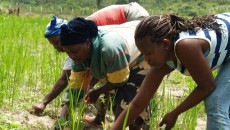MONROVIA, Liberia – The struggle continues for small business.
Since the outbreak of Ebola in Liberia, there is an enormous decline in the Liberian economy.
According to the World Health Organization (WHO) website, the current Ebola outbreak is the largest and most complex Ebola outbreak since the Ebola virus was first discovered in 1976. In addition, it has touched every sector of the country including the economy, health system, government and the education amongst others.
As part of measures to curb the spread of the deadly disease, the Liberian government in August of 2014, mandated that all of its borders should be closed to avoid spreading the disease across borders, as the disease had originated in Guinea. To this day, cross-border trade remains banned.
The Government also instructed a large number of civil servants to stay home, terming them as non-essential staff, to prevent overcrowdedness at various government entities in Monrovia. Furthermore, reports from sources close to the situation state that these members of the staff were paid for four months after.
All these measures have contributed to an increase in the unemployment rate in the country.
Those who are self-employed, especially small business owners, have been reported as the hardest hit. Of course, this is due to a decline in the sales of commodities. According to a survey by the World Bank, about 30% of the working households were self-employed  before the crisis; this is now down to just 10%.
“Since this Ebola, I been facing plenty problems with my market. People don’t even come to buy like the way they used to comeâ€, said Doris Dahn.
She added, “from this morning, they now only buy one bottle of oil, and I have to take money from here to buy food for my children.â€
“The business na going and even if they don’t buy, I will still take money just to buy chlorine for this place,†she lamented.
At the same time, Nancy Bondeh, a petty trader and mother of two children said she does not feel safe whenever she goes to the market. According to her, so many things have changed in the Waterside Market.
“Nothing good in the market now to sell and even buy. When you carry small money for food, it will not serve you.â€
She said, “if you just  take 300 Liberian dollars to buy food in the market it will be hard for you. I used to take 350 Liberian dollars in the market, and it used to buy good food but now I have to take about 500 Liberian dollars just for my family to eat.â€
“I am talking about my boyfriend and two childrenâ€.
Meanwhile, Jerome Nana, a commercial taxi driver, said he used to generate more than $3000 LRD but now he is making as low as $1000 LRD.
Jerome added, “the government’s regulation of three passengers at the back of a taxi is embarrassing our business because we don’t get the kind of money that we made before.â€
“I find it very hard for me, the regulation has brought a decline in my daily income as a taxi driver.â€
The government has yet to announce when these restrictions will be lifted.
Featured image courtesy of  Travis Lupick



